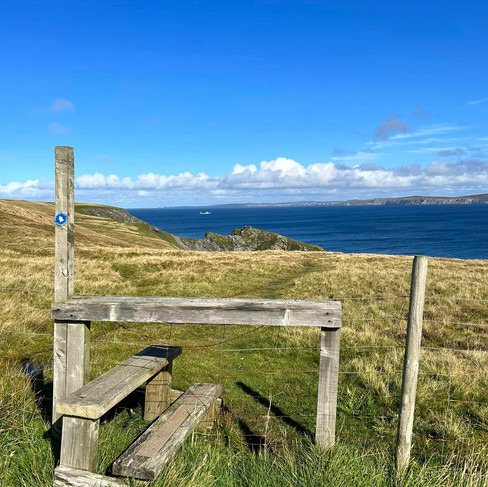A walk to Houlsquoy
- Karen Inkster Vance
- Sep 10, 2023
- 2 min read
Updated: Mar 6, 2024
A trip to Shetland is like taking a step back in time, to the land of my ancestors. Although they lived centuries before, their memory lives on through the stories I have pieced together. Yesterday's journey to Houlsquoy was more than just a walk to a remote and peaceful abandoned place. It was a pilgrimage to pay respect to a few of my ancestors who breathed in the air, fished in the loch, sailed in the sea, and were buried in the Isbister kirkyard, just over the hillside. Returning to Shetland feels like coming home... my troubles feel fewer when I learn about the challenges my ancestors faced...
In 1797 James Inksetter Jr. (born 1777) married Barbara Sinclair (my 4th great-grandparents). They soon began what would become a large family, but their life together was challenged with hardship. James was a fisherman and crofter on the Busta Estate and moved crofts several times between Brebister, Houlsquoy, and Roonip. The Inksters and their neighbours struggled due to years of poor harvests and fishing. In 1811, contrary winds made the fishing “verry poor in general,” with weeks of bad weather where the boats were “never at sea.” At the end of the fishing season, James would neither have been able to pay his rent nor buy meal to feed his family. The following spring, the kirk session gave James five shillings from the poor’s fund to help the family get by. He could only hope for a more prosperous fishing season.

Bad weather again in 1812 meant that James and his fellow fishermen were forced to sit around at the fishing station, waiting. Given any window of opportunity, they would sail off to sea, but the unpredictable weather made this risky. Despite his poverty, with six young children to support at the time, James opted to pay into the newly created Northmavine Fishermen Fund in 1812, an insurance policy that would provide a small stipend to his family should he become lost at sea. In August the men returned from the poor fishing in time for harvest, but their crops failed. The locals were in danger of starvation. In spring 1813, the kirk session provided the family with £1 sterling, “given in charity” from the sacrament collections.
In spite of all these hardships, James and Barbara lived to see their children grow, marry, and obtain crofts, mostly clustered nearby to each other: James (Houll), Andrew (Houlsquoy), John Gifford (Houll), William (West House, Isbister), Peter (Houll), Marion (Isbister) and Agnes (Skelberry). As their children all had young, growing families to feed, when old age and famine hit, the church stepped in again to help the elderly couple. From 1829 through 1831 James, his wife, and sister, all living at Brebister, received money from the poor fund. In times of scarcity it was usually the elderly who paid the price: all three of them died between 1831 and 1832, and when they were laid to rest at the Isbister cemetery, their burial expenses were covered by the kirk.














Comments